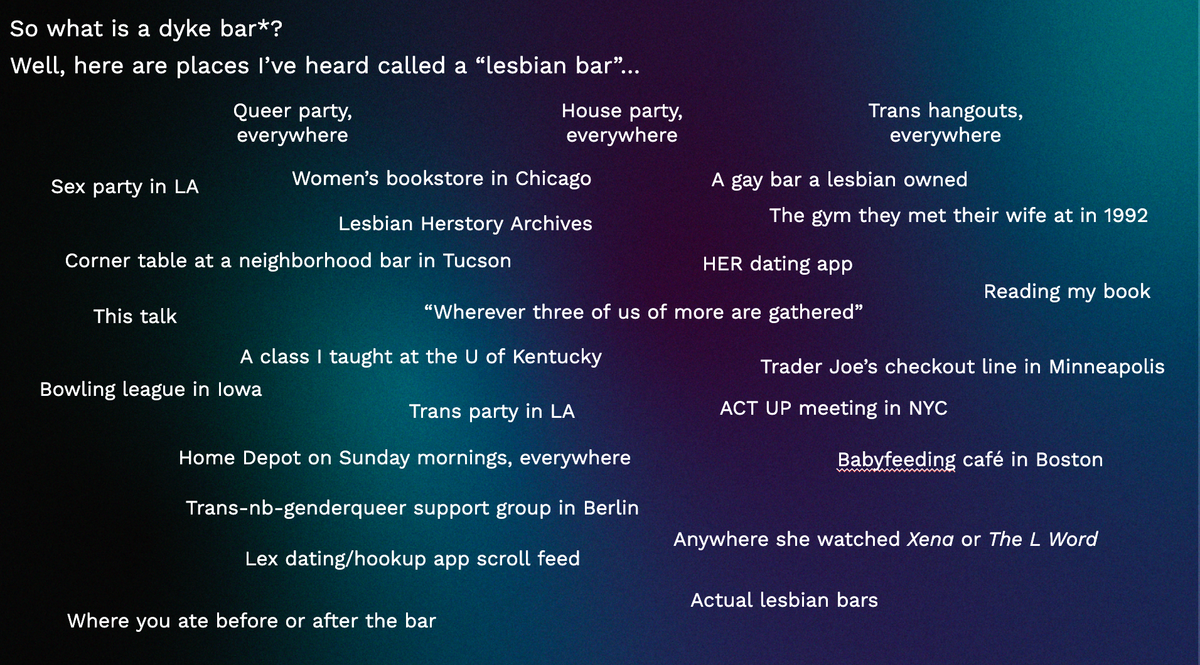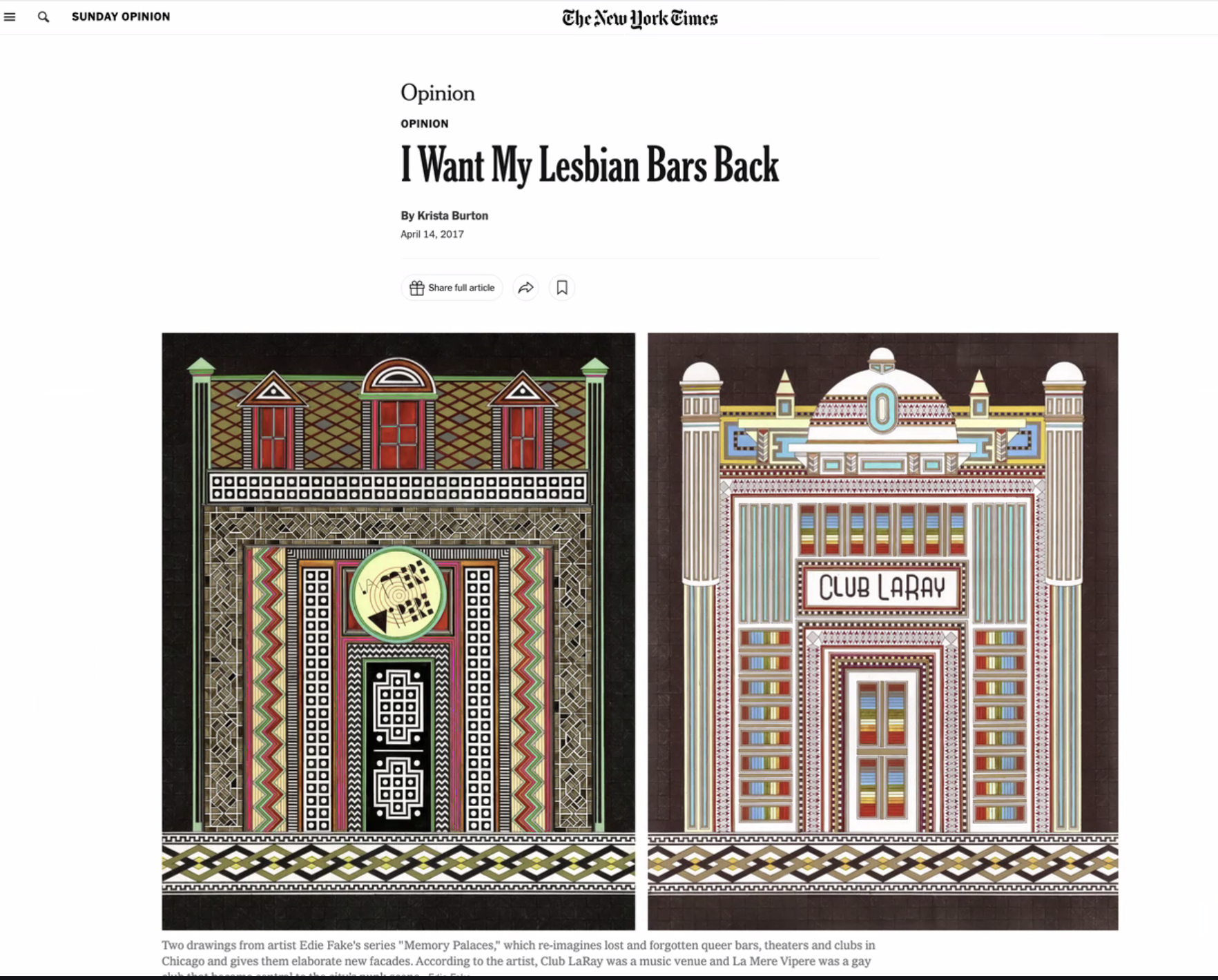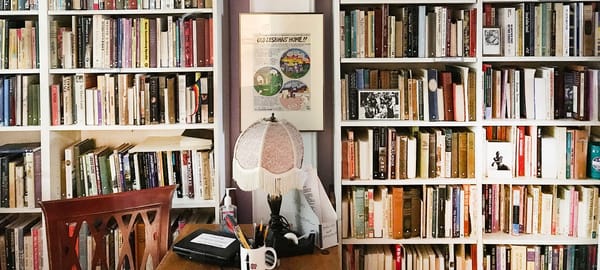"My Lesbian Bar"
One of the first things my partner Rachel said to me was, "My lesbian bar was a babyfeeding café in Boston 2014-2015." And I've been thinking how I didn't bat an eye.

While writing about the reasons lezbiqueertrans people claim the dyke bar* – including lesbian bars, queer parties, and trans hangouts – as their primary space above all others, I was thinking about one of the first things my partner Rachel said to me: "The babyfeeding café in Boston 2014-2015 was my lesbian bar." I didn't blink an eye. My guess is most middle-aged+ dykes, and many younger ones, would get it too. Why? Well...here's my theory:
Through history, media, lack of other public spaces, and a sense of connecting with tr/ancestors, lezbiqueertrans people sometimes yearn for a dyke bar* so much, that we often geographically imagine other places as *our* lesbian bar.
Since I came out, I've heard lezbiqueertrans folks call many, many things a lesbian bar. Heck, I've even done it! Mount Holyoke College 1995-1999 was my lesbian bar, even though we also could go to a literal lesbian bar in Northampton about 20 minutes drive at The Grotto.
So we must ask: is a lesbian bar always a lesbian bar?
We need to a think about the accumulating claims to a place by a marginalized group. And for dykes, like other groups, these claims do really pile up throughout time and around the world. I even made a short video for you to experience that sensation I do as a queer geographer who people love to tell about "my lesbian bar":
VIDEO TEXT (WITH SOME NOTES): So what is a dyke bar*? Well, here are places I’ve heard called a “lesbian bar”… Trans hangouts, everywhere; House party, everywhere; Queer party, everywhere; Women’s bookstore in Chicago(much adoration to Women and Children First bookstore 💗); A gay bar a lesbian owned; Sex party in LA; The gym they met their wife at in 1992; Lesbian Herstory Archives; Corner table at a neighborhood bar in Tucson; HER dating app; Reading books of dyke* history, including my book A Queer New York (this made me teary); “Wherever three of us of more are gathered”; Any public talk I've given on dyke bars* (greeting CUNY Spitzer Architecture, Ole Miss WGSS, Lesbian Lives conference, and Queer and Trans Geographers conference peeps); A class I taught at the U of Kentucky; Trader Joe’s checkout line in Minneapolis;Bowling league in Iowa; ACT UP meeting in NYC; Trans party in LA; Home Depot on Sunday mornings, everywhere; Babyfeeding café in Boston; Trans-nb-genderqueer support group in Berlin; Anywhere she watched Xena or The L Word; Lex dating/hookup app scroll feed; Where you ate before or after the bar; and Actual lesbian bars.
My quick answer to "is a lesbian bar always a lesbian bar?" query is a twofer:
- yes, only a brick-and-mortar, somewhat-ish 24/7 lesbian bar – whether self-identified and/or any bar or party claimed/used as such by lezbiqueertrans folks – is the only kind of physical lesbian bar, and
- the geographical imagination of the lesbian bar is so central to dykedom that it can and must be plied further and further, wider and wider, as a space to hold us near and far.
I mean, c'mon, queers. You know it's never a binary. 😏
Then we need to ask the next and very needed set of questions: Well, what does that mean for us in the long run? Is this a useful practice to keep projecting and claiming and refashioning a claim to a bar? What does it afford us? How does it limit us?
Clearly it isn't just dykes whose geographical imaginations stretch and bound how they see the world, and also affect their social, economic, and political possibilities. All groups of people do this! Nationalism in any state is a fine study. (For example, Americans would do well to read up on Mik Billig's notion of "banal nationalism" enough, the way that American flags, songs, and sentiments permeate our everyday life in ways so totalizing we often don't notice them our grasp their effects; for non-Americans, you already noticed this when you visited or watched any of our exported films, songs, media, etc.
At the same time, lezbiqueertrans people are a people of so few places. While there are a few more "queer" places (namely bars) here and there, there are wildly few that are outright named "lesbian" anymore (compared to the pinnacle in the 1980s), let alone ever named "bi" (I can't think of one place) or "trans" (apart from health clinics, yeeghads),
I've been thinking on these questions for decades now. I'll keep writing more on them. But I think the most important thing to hold on to about them is they give us the chance to imagine and then build the worlds we want, need, and desire. We've done it before and we can and will do it again. And thank Athena that we possess more understanding about how to build worlds that work for more of us, and someday all of us.
One more note: a shout to Krista Burton for taking this deep call of our desire and need for lesbian bars into the NYTimes, back when it wasn't a heinous, vile, anti-trans, pro-right-wing trash. (This post is long enough so I'll get into her wonderful ethnography of the only existing lesbian bars of 2021-2022, Moby Dyke, another day.)





